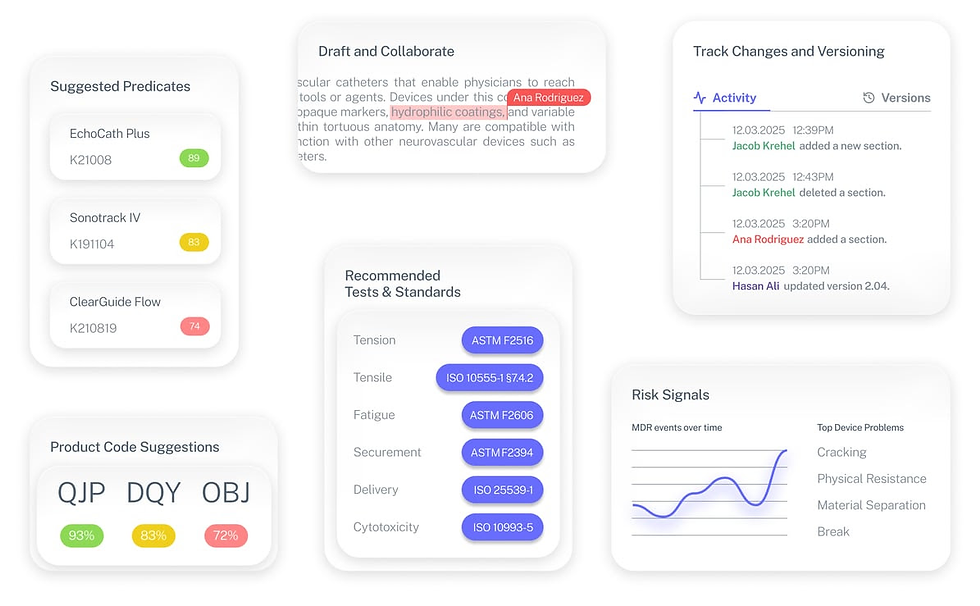FDA eSTAR for SaMD: What Changes After Oct 1 2025?
- Beng Ee Lim

- May 20, 2025
- 3 min read
Updated: Sep 7, 2025
Starting October 1, 2025, all De Novo requests for SaMD must be submitted using the FDA’s eSTAR template. This shift brings new module requirements tailored to software, including design documentation, cybersecurity, verification/validation, and AI lifecycle controls. If you're preparing a SaMD De Novo, this format isn’t optional—it’s the new standard.

What Is eSTAR?
eSTAR stands for Electronic Submission Template and Resource. It’s a structured, interactive PDF the FDA developed to standardize device submissions.
510(k) eSTAR became mandatory in October 2023.
Now, De Novo requests must also use eSTAR starting October 1, 2025.
Benefits:
Built-in validation checks
Auto-populated fields for consistency
Reduced review times due to uniform formatting
The FDA says the eSTAR reduces refuse-to-accept (RTA) rates by flagging errors before submission. But for SaMD companies, it also introduces new content expectations—especially around software-specific documentation.
Key Changes for De Novo SaMD
As of October 2025, you must use the “Electronic Submission Template for Medical Device De Novo Requests”.
Here’s what matters for SaMD teams:
🔹 Software Description & Design Controls
Describe the intended use, architecture, and software functions
Map to design inputs/outputs and risk controls
🔹 SBOM & Cybersecurity
Submit a full Software Bill of Materials (SBOM)
Include cyber risk management and threat mitigation strategies
🔹 Software Verification & Validation
Show traceability matrix
Include test protocols, error handling, edge-case testing
🔹 Device Software Function & AI/ML Lifecycle
Describe Device Software Functions (DSFs)
If AI-enabled, include model training, performance bounds, and update plans
Note: This is where the FDA expects transparency about algorithm retraining and human-in-the-loop safeguards.
How These Changes Impact Your SaMD Filing
This isn’t just a new form—it’s a new submission philosophy.
You’ll need to:
Reorganize your documentation into eSTAR-defined modules
Use only the latest eSTAR version (download from FDA’s CDRH site)
Ensure internal teams and vendors (e.g., software test labs) deliver in compatible formats
Timeline shifts:
Allow 1–2 extra weeks for eSTAR PDF formatting and validation
Portal upload requires strict file-size limits (<150 MB PDF)
Plan a pre-submission Q-Sub for complex DSF or AI features
Common eSTAR pitfalls:
❌ Missing required XML tags
❌ Table of contents doesn’t match module order
❌ Using outdated template version (always check for updates)
Step-by-Step eSTAR Prep Checklist
Module | Docs Needed | Owner | Status |
Software Description | Architecture diagrams, user-needs traceability | … | [ ] |
Design Controls | Risk assessment (ISO 14971), requirement specs | … | [ ] |
SBOM & Cybersecurity | Software BOM, patch-management plan | … | [ ] |
Verification & Validation | Test protocols, reports, validation summary | … | [ ] |
DSF & AI/ML Lifecycle | Model description, performance metrics, PCCP | … | [ ] |
Best Practices & Pro Tips
✅ Always use the latest template (verify on FDA’s eSTAR page)
✅ Validate early: run your draft through the eSTAR Validator before final upload
✅ Leverage auto-populated sections for device identifiers, product codes, and predicate references
✅ Keep version control: name your files eSTAR_DeNovo_v5.2_YourDeviceName.pdf
The Fastest Path to Market
No more guesswork. Move from research to a defendable FDA strategy, faster. Backed by FDA sources. Teams report 12 hours saved weekly.
FDA Product Code Finder, find your code in minutes.
510(k) Predicate Intelligence, see likely predicates with 510(k) links.
Risk and Recalls, scan MAUDE and recall patterns.
FDA Tests and Standards, map required tests from your code.
Regulatory Strategy Workspace, pull it into a defendable plan.
👉 Start free at complizen.ai

FAQs
Q: Is eSTAR mandatory for my 510(k) and De Novo?
Yes—510(k) since 2023, and De Novo starting October 1, 2025.
Q: What if I miss the Oct 1, 2025 deadline?
Your submission will be rejected—FDA won’t accept De Novos outside the eSTAR format after that date.
Q: Where do I get the latest eSTAR template?
From the FDA’s CDRH website under the eSTAR program section.


